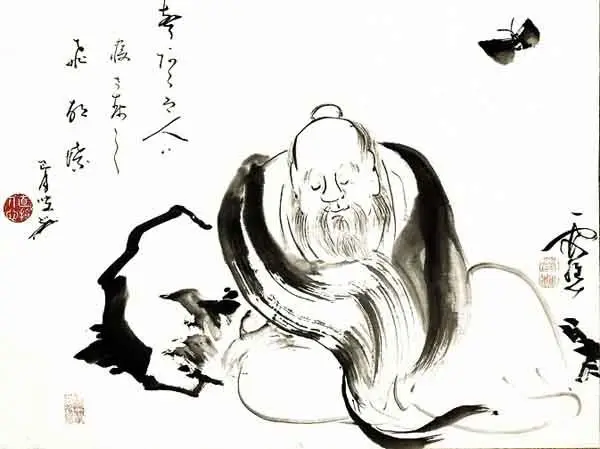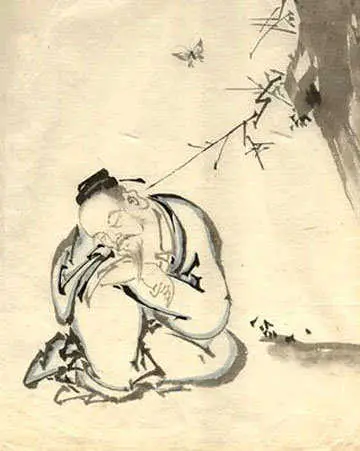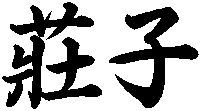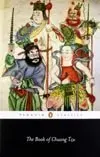|
Tao Te Ching
THE TAOISM OF LAO TZU
|
Chuang Tzu 5 The Taoist Text, Chapter 5
The Seal of Virtue Complete.1. In Lû there was a Wang Thâi who had lost both his feet; while his disciples who followed and went about with him were as numerous as those of Kung-nì. Khang Kì asked Kung-nì about him, saying, "Though Wang Thâi is a cripple, the disciples who follow him about divide Lû equally with you, Master. When he stands, he does not teach them; when he sits, he does not discourse to them. But they go to him empty, and come back full. Is there indeed such a thing as instruction without words? and while the body is imperfect, may the mind be complete? What sort of man is he?"
Kung-nì replied, "This master is a sage. I have only been too late in going to him. I will make him my teacher; and how much more should those do so who are not equal to me! Why should only the state of Lû follow him? I will lead on all under heaven with me to do so." Khang Kì rejoined, "He is a man who has lost his feet, and yet he is known as the venerable Wang;- he must be very different from ordinary men. What is the peculiar way in which he employs his mind?" The reply was, "Death and life are great considerations, but they could work no change in him. Though heaven and earth were to be overturned and fall, they would occasion him no loss. His judgment is fixed regarding that in which there is no element of falsehood; and, while other things change, he changes not. The transformations of things are to him the developments prescribed for them, and he keeps fast hold of the author of them." Khang Kì said, "What do you mean?" "When we look at things," said Kung-nì, "as they differ, we see them to be different, (as for instance) the liver and the gall, or Khû and Yüeh; when we look at them, as they agree, we see them all to be a unity. So it is with this (Wang Thâi). He takes no knowledge of the things for which his ears and eyes are the appropriate organs, but his mind delights itself in the harmony of (all excellent) qualities. He looks at the unity which belongs to things, and does not perceive where they have suffered loss. He looks on the loss of his feet as only the loss of so much earth." Khang Kì said, "He is entirely occupied with his (proper) self. By his knowledge he has discovered (the nature of) his mind, and to that he holds as what is unchangeable; but how is it that men make so much of him?" The reply was, "Men do not look into running water as a mirror, but into still water;- it is only the still water that can arrest them all, and keep them (in the contemplation of their real selves). Of things which are what they are by the influence of the earth, it is only the pine and cypress which are the best instances;- in winter as in summer brightly green. Of those which were what they were by the influence of Heaven, the most correct examples were Yâo and Shun; fortunate in (thus) maintaining their own life correct, and so as to correct the lives of others. "As a verification of the (power of) the original endowment, when it has been preserved, take the result of fearlessness,- how the heroic spirit of a single brave soldier has been thrown into an army of nine hosts. If a man only seeking for fame and able in this way to secure it can produce such an effect, how much more (may we look for a greater result) from one whose rule is over heaven and earth, and holds all things in his treasury, who simply has his lodging in the six members of his body, whom his ears and eyes serve but as conveying emblematic images of things, who comprehends all his knowledge in a unity, and whose mind never dies! If such a man were to choose a day on which he would ascend far on high, men would (seek to) follow him there. But how should he be willing to occupy himself with other men?"
Mr. Toeless, however, told Lâo Tan (of the interview), saying, "Khung Khiû, I apprehend, has not yet attained to be a Perfect man. What has he to do with keeping a crowd of disciples around him? He is seeking to have the reputation of being an extraordinary and marvellous man, and does not know that the Perfect man considers this to be as handcuffs and fetters to him." Lâo Tan said, "Why did you not simply lead him to see the unity of life and death, and that the admissible and inadmissible belong to one category, so freeing him from his fetters? Would this be possible?" Toeless said, "It is the punishment inflicted on him by Heaven. How can he be freed from it?"
Kung-nì said, "Once when I was sent on a mission to Khû, I saw some pigs sucking at their dead mother. After a little they looked with rapid glances, when they all left her, and ran away. They felt that she did not see them, and that she was no longer like themselves. What they had loved in their mother was not her bodily figure, but what had given animation to her figure. When a man dies in battle, they do not at his interment employ the usual appendages of plumes: as to supplying shoes to one who has lost his feet, there is no reason why he should care for them;- in neither case is there the proper reason for their use. The members of the royal harem do not pare their nails nor pierce their ears; when a man is newly married, he remains (for a time) absent from his official duties, and unoccupied with them. That their bodies might be perfect was sufficient to make them thus dealt with;- how much greater results should be expected from men whose mental gifts are perfect! This Âi-thâi Tho was believed by men, though he did not speak a word; and was loved by them, though he did no special service for them. He made men appoint him to the government of their states, afraid only that he would not accept the appointment. He must have been a man whose powers were perfect, though his realisation of them was not manifested in his person. Duke Âi said, "What is meant by saying that his powers were complete?" Kung-nì replied, "Death and life, preservation and ruin, failure and success, poverty and wealth, superiority and inferiority, blame and praise, hunger and thirst, cold and heat;- these are the changes of circumstances, the operation of our appointed lot. Day and night they succeed to one another before us, but there is no wisdom able to discover to what they owe their origination. They are not sufficient therefore to disturb the harmony (of the nature), and are not allowed to enter into the treasury of intelligence. To cause this harmony and satisfaction ever to be diffused, while the feeling of pleasure is not lost from the mind; to allow no break to arise in this state day or night, so that it is always spring-time in his relations with external things; in all his experiences to realise in his mind what is appropriate to each season (of the year):- these are the characteristics of him whose powers are perfect." "And what do you mean by the realisation of these powers not being manifested in the person?" (pursued further the duke). The reply was, "There is nothing so level as the surface of a pool of still water. It may serve as an example of what I mean. All within its circuit is preserved (in peace), and there comes to it no agitation from without. The virtuous efficacy is the perfect cultivation of the harmony (of the nature). Though the realisation of this be not manifested in the person, things cannot separate themselves (from its influence)." Some days afterwards duke Âi told this conversation to Min-tsze, saying, "Formerly it seemed to me the work of the sovereign to stand in court with his face to the south, to rule the kingdom, and to pay good heed to the accounts of the people concerned, lest any should come to a (miserable) death;- this I considered to be the sum (of his duty). Now that I have heard that description of the Perfect man, I fear that my idea is not the real one, and that, by employing myself too lightly, I may cause the ruin of my state. I and Khung Khiû are not on the footing of ruler and subject, but on that of a virtuous friendship."
Hui-tsze said to Kwang-tsze, "Can a man indeed be without desires and passions?" The reply was, "He can." "But on what grounds do you call him a man, who is thus without passions and desires?" Kwang-tsze said, "The Tâo gives him his personal appearance (and powers); Heaven gives him his bodily form; how should we not call him a man?" Hui-tsze rejoined, "Since you call him a man, how can he be without passions and desires?" The reply was, "You are misunderstanding what I mean by passions and desires. What I mean when I say that he is without these is, that this man does not by his likings and dislikings do any inward harm to his body;- he always pursues his course without effort, and does not (try to) increase his (store of) life." Hui-tsze rejoined, "If there were not that increasing of (the amount) of life, how would he get his body?" Kwang-tsze said, "The Tâo gives him his personal appearance (and powers); Heaven gives him his bodily form; and he does not by his likings and dislikings do any internal harm to his body. But now you, Sir, deal with your spirit as if it were something external to you, and subject your vital powers to toil. You sing (your ditties), leaning against a tree; you go to sleep, grasping the stump of a rotten dryandra tree. Heaven selected for you the bodily form (of a man), and you babble about what is strong and what is white." 
Chuang Tzu
 The Book of Chuang TzuA modern translation of Chuang Tzu, by Martin Palmer and Elizabeth Breuilly.See the book at Amazon
About CookiesMy Other Websites:I Ching OnlineThe 64 hexagrams of the Chinese classic I Ching and what they mean in divination. Try it online for free.
Qi Energy ExercisesThe ancient Chinese life energy qi (chi) explained, with simple instructions on how to exercise it.
Life EnergyThe many ancient and modern life force beliefs all over the world explained and compared.
Taoismen på svenska
Other Books by Stefan StenuddClick the image to see the book at Amazon (paid link).
The Greek philosophers and what they thought about cosmology, myth, and the gods. |
 Tao Te Ching
Tao Te Ching Tao Quotes
Tao Quotes Fake Lao Tzu Quotes
Fake Lao Tzu Quotes Cosmos of the Ancients
Cosmos of the Ancients Qi — Increase Your Life Energy
Qi — Increase Your Life Energy Aikido Principles
Aikido Principles Life Energy Encyclopedia
Life Energy Encyclopedia Archetypes of Mythology
Archetypes of Mythology Stefan Stenudd
Stefan Stenudd